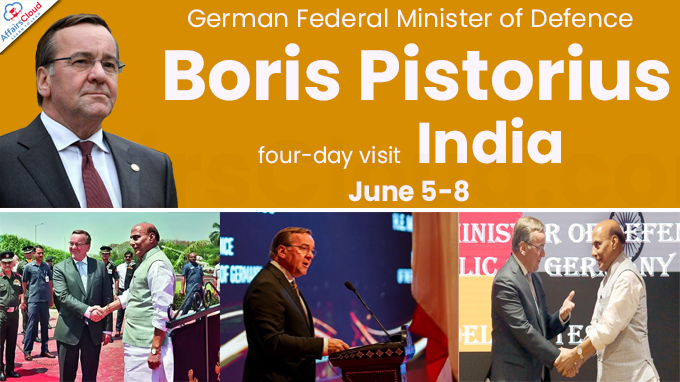 The Federal Minister of Defence of Germany, Boris Pistorius was on a 4-day official visit to India from June 5-8, 2023 for facilitating bilateral defence cooperation and exploring avenues for strategic partnership.
The Federal Minister of Defence of Germany, Boris Pistorius was on a 4-day official visit to India from June 5-8, 2023 for facilitating bilateral defence cooperation and exploring avenues for strategic partnership.
- This is the first visit of a German Defence Minister to India since 2015.
Meeting with Defence Minister Rajnath Singh:
Defence Minister Boris Pistorius and India’s Union Minister Rajnath Singh, Ministry of Defence hold talks to enhance bilateral defence cooperation, particularly industrial partnership.
i.The issue of global supply chain disruptions was also discussed and the Indian side asked the German side to diversify their supply chains to stable and open countries.
- In this regard, India asked Germany to relax some of their licensing requirements for the export of spares and components under the German federal agency, BAFA (Federal Office for Economic Affairs and Export Control). A list was submitted to Germany for the same.
- It was stressed that Germany should treat India as a privileged partner.
ii.Indian side highlighted the opportunities in the defence production sector, including the possibilities for German investments in the two Defence Industrial Corridors (DICs) in Uttar Pradesh (UP) & Tamil Nadu (TN).
Other Participants:
Defence Secretary Giridhar Aramane and Chief of Defence Staff (CDS) General Anil Chauhan, among others, participated in the delegation-level meeting. From the German side, State Secretary from the Ministry of Defence Benedikt Zimmer, German Ambassador to India, Philipp Ackermann, and other senior officials from Germany’s Federal Ministry of Defence participated in the meeting.
Germany’s TKMS and India’s MDL sign pact for bid IN’s Rs 43,000cr P75I Project
German defence major Thyssenkrupp Marine Systems (TKMS) and state-run Mazagon Dock Shipbuilders Limited (MDL) signed a Memorandum of Understanding (MoU) for Indian Navy’s (IN) P-75 India (P75I) Submarine Project in Mumbai, Maharashtra in the presence of German Defence Minister Boris Pistorius.
About P75I Project:
With an outlay of over Rs 45,000 crore, in June 2021, the Ministry of Defence (MoD) cleared the mega project to domestically construct 6 conventional submarines with better sensors and weapons and the Air Independent Propulsion System (AIP) through a Strategic Partnership (SP) model.
This model allows domestic defence manufacturers to join hands with leading foreign defence majors to produce high-end military platforms to reduce import dependence. It means, Indian shipyard will be selected by the government, which will also nominate the foreign original equipment manufacturer (OEM) under the overall arch of ‘Make in India’.
In this regard, Indian Government shortlisted MDL and Larsen & Toubro (L&T) have been shortlisted to partner with foreign OEM. As foreign partners, only Germany and South Korea technically meet the criteria to submit bids under P-75I
- The bidding process for the project called P-75 India ends in August 2024.
What is the MoU?
According to the MoU, TKMS would contribute to the engineering and design of the submarines as well as provide consultancy support to the joint project, while MDL would take the responsibility of constructing and delivering the respective submarines.
- TKMS is a market leader for non-nuclear submarines. If all goes smoothly and Germany bags the contract, the earliest the first P-75I submarine can be commissioned is around 2032.
Note: Also, with the deal, Germany envisages reducing India’s Berlin dependence on Russia in the defence sector. In 2022, according to the Stimson Center, 70% to 85% of India’s military platforms are of Russian origin.
Key Points:
i.Currently, India has 17 conventional diesel-electric submarines, which are classified as SSKs.
- Of the 17 SSKs, four are of Shishumar Class, which were bought and then built in India in collaboration with the Germans starting 1980s.
- 7 are Kilo Class or Sindhughosh Class submarines bought from Russia (including erstwhile USSR) between 1984 and 2000
- 6 are Kalvari Class built in India at MDL.
ii.To meet the P-75I requirement, TKMS is expected to offer the Indian Navy its Type 214 SSK.
iii.It should be noted that the fifth Scorpene-type submarine (Kalvari-class) submarine INS (Indian Naval Ship) Vagir was commissioned in January 2023 under French Technology Transfer.
- INS Vagsheer, the sixth such submarine, is expected to be inducted in 2024.
Others:
i.Germany’s Defence Minister Boris Pistorius was honoured with the Tri-Service Guard of Honour.
ii.He visited the Headquarters, Western Naval Command and MDL in Mumbai.
iii.He interacted with some Indian defence start-ups at IIT (Indian Institute of Technology) Delhi, in an event organised by Innovations for Defence Excellence (iDEX).
- The event showcased game-changing technologies by Indian start-ups on augmented reality/virtual reality, energy systems, smart drones and anti-drone systems, space propulsion systems and other allied technologies.
iv.He also Laid a wreath on the National War Memorial, New Delhi, Delhi.
Note:
India and Germany have had a Strategic Partnership since 2000, which has been strengthened through Inter-Governmental Consultations since 2011 at the level of Heads of Government. India was among the first countries to establish diplomatic ties with Germany after the Second World War.
Recent Related News:
i.On April 25, 2023, The Department of Consumer Affairs, under the Ministry of Consumer Affairs, Food & Public Distribution, and the German Federal Ministry for Economic Affairs and Climate Action signed the new Work Plan for 2023 during the 9th Annual Meeting of the Indo-German Working Group on Quality Infrastructure (QI) in Berlin, Germany.
ii.The “World Energy Transitions: Outlook (WETO) 2023: 1.5°C Pathway” released by International Renewable Energy Agency (IRENA) in Berlin(Germany), shows that the global energy transition is off-track, aggravated by the effects of global crises and calls for a fundamental change of course in the energy transition.
About Germany:
Capital– Berlin
Currency– Euro
President– Frank-Walter Steinmeier




